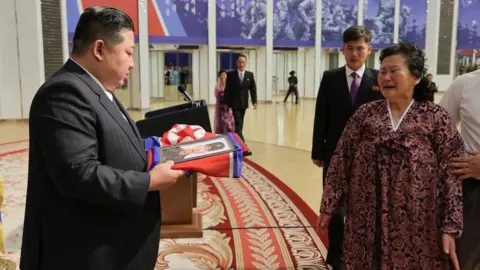North Korea's leader, Kim Jong Un, has met the families of soldiers killed fighting for Russia against Ukraine and expressed his deep condolences, state media reports.
In a special ceremony held on Friday, Kim comforted bereaved families, presenting them with portraits of their deceased loved ones wrapped in the North Korean flag.
South Korea estimates that North Korea has sent approximately 15,000 troops to assist Russia in its conflict with Ukraine, alongside missiles and long-range weapons. In turn, North Korea reportedly received food, money, and technical assistance.
The North only confirmed its involvement in the foreign conflict in April, acknowledging the deaths of some of its soldiers.
In January, Western officials had informed the BBC that they believed at least 1,000 North Korean troops were killed within three months, although recent estimates suggest closer to 600 fatalities.
Friday's ceremony was the second of its kind in one week, where Kim expressed his sorrow over the inability to bring the fighters back alive and promised to construct a monument honoring them and to care for their children.
Kim stated, I thought a lot about other martyrs' families who were not present... So, I had this meeting arranged as I wanted to meet and console the bereaved families of all the heroes and relieve their sorrow and anguish even a little, according to KCNA.
Next week, Kim is scheduled to meet Russian President Vladimir Putin in China during a military parade commemorating Japan's surrender in World War II. This marks their third meeting in two years, reflecting deepening cooperation and enhanced relations between Moscow and Pyongyang.
In October, Kim sent Putin a birthday message labeling him as his closest comrade. That same month, a military pact was introduced, indicating mutual support in case of aggression against either nation.
As North Korea maintains an active military of roughly 1.28 million soldiers, the deployment in Ukraine marked its first experience of combat operations beyond its borders in recent times.
}















